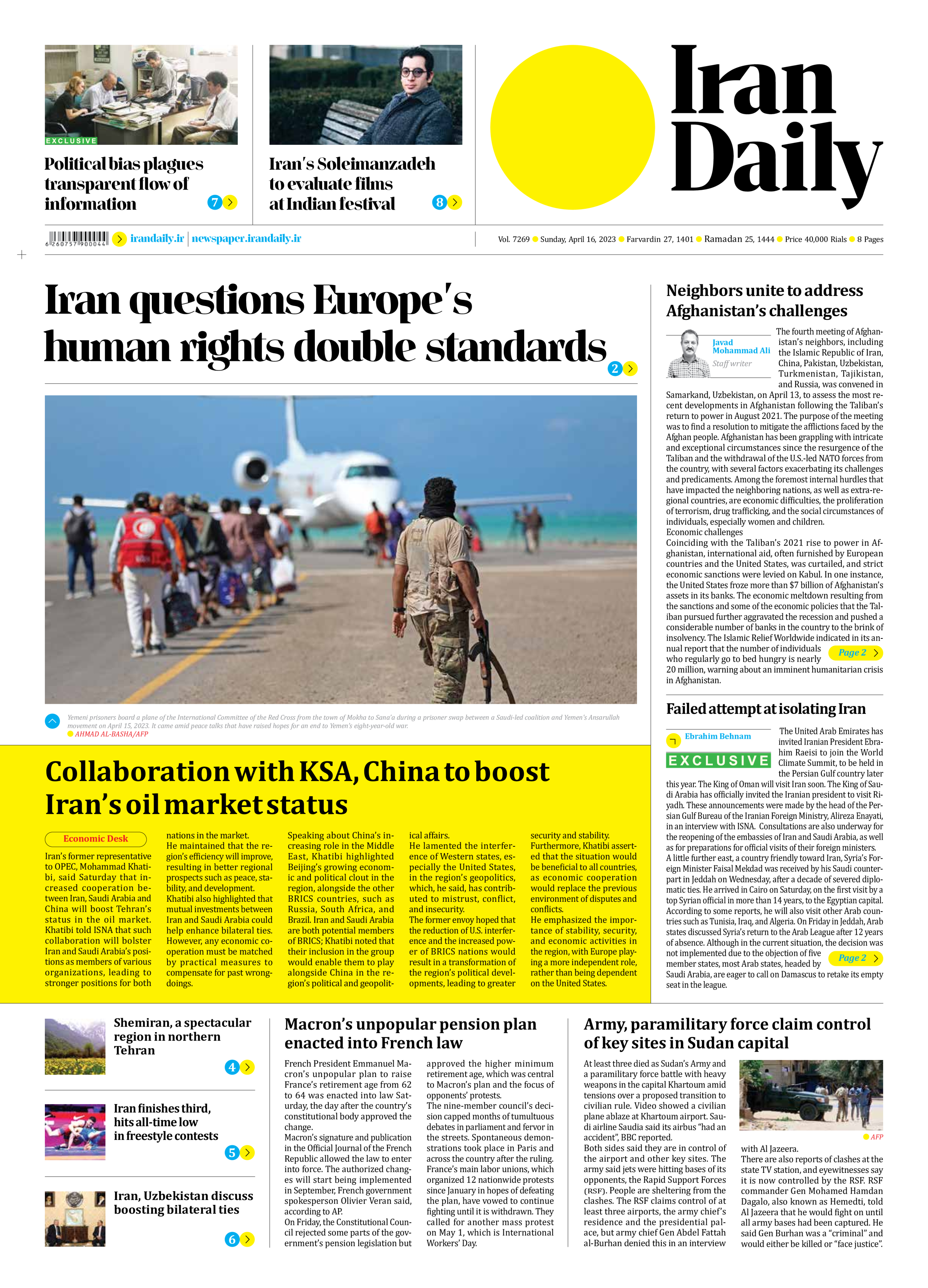
Neighbors unite to address Afghanistan’s challenges
Javad Mohammad Ali
Staff writer
The fourth meeting of Afghanistan’s neighbors, including the Islamic Republic of Iran, China, Pakistan, Uzbekistan, Turkmenistan, Tajikistan, and Russia, was convened in Samarkand, Uzbekistan, on April 13, to assess the most recent developments in Afghanistan following the Taliban’s return to power in August 2021. The purpose of the meeting was to find a resolution to mitigate the afflictions faced by the Afghan people. Afghanistan has been grappling with intricate and exceptional circumstances since the resurgence of the Taliban and the withdrawal of the U.S.-led NATO forces from the country, with several factors exacerbating its challenges and predicaments. Among the foremost internal hurdles that have impacted the neighboring nations, as well as extra-regional countries, are economic difficulties, the proliferation of terrorism, drug trafficking, and the social circumstances of individuals, especially women and children.
Economic challenges
Coinciding with the Taliban’s 2021 rise to power in Afghanistan, international aid, often furnished by European countries and the United States, was curtailed, and strict economic sanctions were levied on Kabul. In one instance, the United States froze more than $7 billion of Afghanistan’s assets in its banks. The economic meltdown resulting from the sanctions and some of the economic policies that the Taliban pursued further aggravated the recession and pushed a considerable number of banks in the country to the brink of insolvency. The Islamic Relief Worldwide indicated in its annual report that the number of individuals who regularly go to bed hungry is nearly 20 million, warning about an imminent humanitarian crisis in Afghanistan.
Migrant crisis
This domestic economic turmoil has assumed regional and international dimensions and triggered a surge of migrants from various Afghan cities to the neighboring nations, especially Iran. According to the international statistics of the International Organization for Migration and the United Nations High Commissioner for Refugees, there are nearly five million Afghans residing in Iran, with an additional half a million Afghan immigrants entering Iran in 2021, coinciding with the Taliban’s return.
Security challenges
Terrorism and the emergence of Daesh, or ISIS, in Afghanistan have worsened the country’s already complex and challenging situation. In the wake of its collapse in the Middle East, ISIS has concentrated its terrorist activities on specific parts of Afghanistan, launching brutal attacks against civilians, particularly Shias and Hazaras, resulting in the loss of thousands of Afghan lives. Despite having given refuge to millions of Afghan refugees, motivated by humanitarianism and international responsibility, Afghanistan’s neighboring countries cannot tolerate border security issues, particularly with the presence of terrorist groups such ISIS.
Iran has drawn a firm red line on border and internal security, sanctioning any measures required to protect them at all levels. Iran’s participation in the meetings of Afghanistan’s neighbors chiefly focuses on the issue of its border security, which has faced the menace of drug trafficking and human smuggling for years, resulting in significant financial and human losses.
Role of education
Alongside security and diplomatic apprehensions, Iran has raised concerns over the re-emergence of specific kinds of ideologies following the Taliban’s re-establishment in Afghanistan. The consequences are social, particularly in regard to women’s education and presence in the society, about which the Islamic Republic has already warned. Iran emphasizes the significance of education for Afghan women and girls, and has expressed its readiness to provide more assistance through the United Nations and encourage the interim governing body in this critical matter.
The neighboring countries of Afghanistan are working together to address the challenges facing the country, especially in the aftermath of the Taliban’s return to power. Economic difficulties, terrorism, drug trafficking, and refugee crises are just some of the issues that need to be addressed. In response, the international community has pledged humanitarian aid and support, with several countries committing to accepting Afghan refugees. While there is much work to be done, there is hope that through collaboration and cooperation, Afghanistan can rebuild and move toward a brighter future. It will require significant effort and resources, but with the right approach and sustained commitment, positive change is possible.







